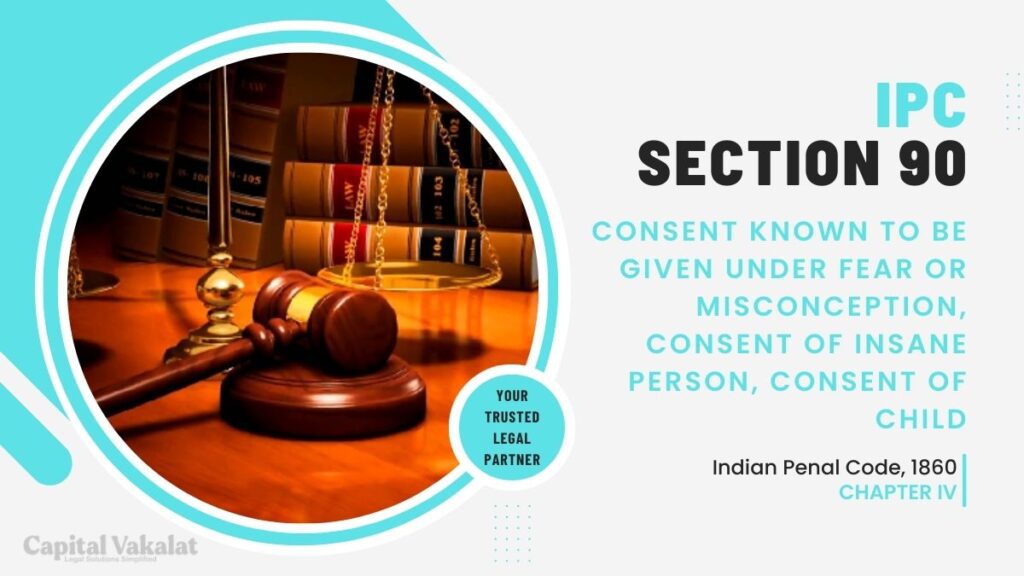In the vast legal landscape of India, Section 90 of the Indian Penal Code (IPC) plays a crucial role in defining the boundaries of consent, especially in situations where fear, misconception, insanity, or childhood come into play. This section sheds light on the complexities of consent, and it is essential to understand its implications.

In this article, we will delve into the intricacies of Section 90 IPC, exploring its various aspects and providing clarity on its interpretation.
What is Section 90 IPC?
Section 90 of the Indian Penal Code deals with situations where consent is given under fear or misconception, consent of an insane person, and consent of a child. It is a pivotal section that safeguards the rights and dignity of individuals who might be in vulnerable positions. Let’s explore the intricacies of this section in detail.
Consent Under Fear or Misconception
The Concept of Fear
Fear is a powerful emotion that can compel individuals to make decisions they wouldn’t otherwise make. In legal terms, consent obtained under duress or fear is not considered genuine consent. Section 90 IPC recognizes this and seeks to protect individuals who may be coerced into giving consent due to fear.
Misconception Leading to Consent
Misconception, too, can invalidate consent. When someone is misled or deceived into giving consent, it lacks the essential element of informed choice. Section 90 IPC acknowledges this by deeming such consent as void.
Consent of an Insane Person
Defining an Insane Person
Section 90 IPC also addresses situations involving individuals who are not of sound mind. An insane person lacks the capacity to give informed and voluntary consent due to their mental state.
Capacity to Give Consent
To be legally valid, consent must come from a person with the mental capacity to understand the implications of their actions. Section 90 IPC ensures that consent from an insane person is not recognized unless they have the requisite mental capacity.
Consent of a Child
Age of Consent
In cases involving children, age plays a crucial role. The law prescribes a minimum age below which a child’s consent is not considered legally valid. This age varies from jurisdiction to jurisdiction.
Understanding Child Psychology
Recognizing the vulnerability of children, Section 90 IPC acknowledges that they may not fully comprehend the consequences of their actions. Therefore, their consent must be scrutinized carefully.
Significance of Section 90 IPC
Protecting Vulnerable Individuals
Section 90 IPC plays a pivotal role in protecting vulnerable individuals who may be subject to coercion, deception, or exploitation. It ensures that consent is genuine and based on free will.
Upholding Ethical Standards
By invalidating consent obtained through fear, misconception, insanity, or from a child, Section 90 IPC upholds ethical standards and promotes a just society.
Challenges in Implementation
Ambiguities and Gray Areas
The implementation of Section 90 IPC is not without challenges. Ambiguities and gray areas exist, making it essential for legal experts to navigate these complexities.
Legal Reforms
Efforts are ongoing to address the shortcomings and challenges in the application of Section 90 IPC. Legal reforms are being considered to make the law more robust and effective.
Conclusion
In conclusion, Section 90 IPC serves as a vital legal safeguard to ensure that consent is genuine, informed, and voluntary. It addresses situations involving fear, misconception, insanity, and childhood, providing protection to vulnerable individuals.
FAQs
Can consent under fear be considered valid?
No, consent obtained under fear is not considered valid under Section 90 IPC.
How does the law define an insane person?
An insane person, in the context of Section 90 IPC, is someone who lacks the mental capacity to give informed and voluntary consent.
Is there a minimum age for a child to provide consent?
Yes, there is a minimum age for a child to provide legally valid consent, which varies by jurisdiction.
What are the key challenges in applying Section 90 IPC?
Challenges include ambiguities in interpretation and the need for legal reforms to address these issues.